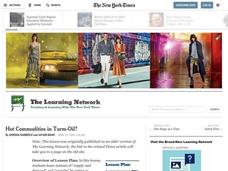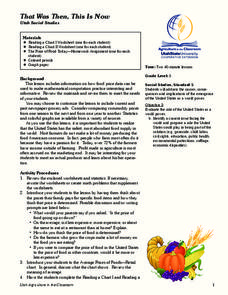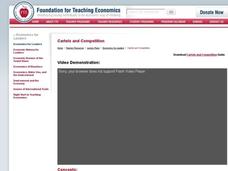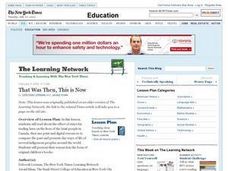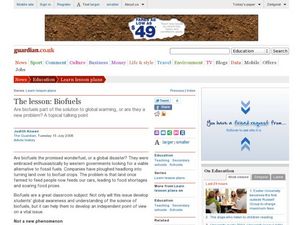Curated OER
Lesson 9: Tracking Commodities
Over the corse of a month, small groups will monitor the price of a specific energy commodity and analyze it in relation to global and domestic events. They play a trade simulation game and create infographics showing what they've...
Curated OER
Why Do Gasoline Prices React to Things That Have Not Happened?
Young scholars investigate how the price of gas is determined. In this economics lesson, students analyze supply and demand and seasonal demand, create tables and graphs and reflect on consumer expectations.
Curated OER
Trade Allows Us To Buy Products at Reasonable Prices
High schoolers discover that trade allows us to buy products at reasonable prices. They research information based on the group they belong to. They participate in a debate based on the different positions.
Curated OER
Purchasing Flower Power
Students fabricate decorative flowers to serve as a sales commodity. They assign value and prices to their flower stems. Students estimate and calculate costs using decimal points and place values in order to keep within a budget they...
Curated OER
Hot Commodities in Turm-Oil?
Learners assess their daily consumption of oil and petroleum-based products. They examine current global oil supply situation.
Curated OER
That was Then, This is Now
Students compare and contrast data charts and statistics for food prices of now and in the past. In this food prices lesson plan, students answer short answer questions and calculate computations.
Curated OER
Over a Barrel
Students examine oil reliance in Britain and around the world. In this oil crisis lesson plan, students discuss how oil is produced and consider the supply left in the world. Students also examine the influences of oil prices and...
Curated OER
Cartels and Competition
Learners work together in teams to role-play a cartel. Using that information, they all produce the same commodity and they are trying to make as much profit as possible. Each group completes a balance sheet and calculate the amount of...
Curated OER
Water Consumption, Pricing and Conservation in Utah.
Students investigate the research report that measures the levels of water usage for Utah. They focus on conservation efforts that are currently being used. They reflect upon their own amount of water usage and research methods of...
Curated OER
The Big Apple
Young scholars study the buying and selling market and how prices are determined for an agricultural product. In this competitive market lesson, students study how prices are determined in a market by studying the forces of supply and...
Curated OER
At Your Fingertips
First graders observe a variety of different foods including kiwi, banbnas, coffee, chocolate and discuss where they come from. They discuss the terms import and export then identify the locations where the items came from and their...
Curated OER
That Was Then, This Is Now
Students examine the price of food over time. They analyze charts, perform math operations and compare and contrast data about the price of food. They complete worksheets while interperting the charts.
Curated OER
The Fact Finders
Students analyze agricultural data and make predictions about events in history. In this history lesson plan, students correlate the relationship between historic events and issues in agriculture to see if there is a correlation. They...
Curated OER
Arthur Young and the President
Young scholars work with NASS data by converting it into prose. In this historical agriculture information instructional activity, students read about how George Washington communicated information about crop yields, livestock, and land...
Curated OER
The Stock Market: High School Economics
High school economists learn about the stock market in a project where they "buy" and track stocks. The author of this resource reports it is the high point of her 12th grade economics course, but no resources are attached. After viewing...
Curated OER
Market Game in Oil
Young scholars work together to participate in a market game in oil. Using their prior knowledge, they review how the interaction of buyers and sellers sets the price in markets. They identify the situations in which cause shortages and...
Curated OER
The Economics of Organic Agriculture
Young scholars examine how organic agriculture affects farm profitability and how government programs affect organic agriculture. In this organic agriculture lesson students complete an activity on costs and returns.
Curated OER
The Stock Market
Twelfth graders study the stock market and how to read stock market pages. They write reports about and graph the performance of various stocks. They examine economic crashes in history and write and perform a skit about the market.
Curated OER
The Lesson: Bio-fuels
Students explore the pros and cons of bio-fuel use. In this environmental stewardship lesson, students visit selected websites to discover what bio-fuels are and the effect they may have on the environment.
Curated OER
Tomatoes for Toyotas
Young scholars investigate and become aware of our country's trade relations with East Asia with emphasis placed on Japan. They explore the global affect of technology, production, distribution and consumption as well as exchange and...
Curated OER
Trade Is A Complex Chain of Events
Students research the steps that are involved to bring a product to market for consumers. They answer questions and fill in a chart related to their product. They also use maps to show the geographic distribution of their product.






